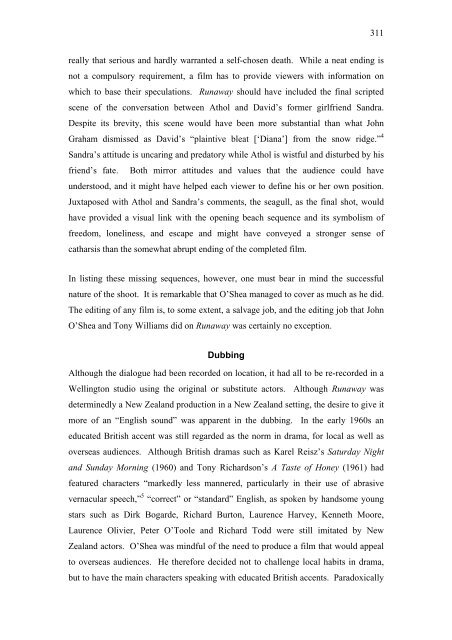Copyright Statement - ResearchSpace@Auckland
Copyright Statement - ResearchSpace@Auckland
Copyright Statement - ResearchSpace@Auckland
You also want an ePaper? Increase the reach of your titles
YUMPU automatically turns print PDFs into web optimized ePapers that Google loves.
311<br />
really that serious and hardly warranted a self-chosen death. While a neat ending is<br />
not a compulsory requirement, a film has to provide viewers with information on<br />
which to base their speculations. Runaway should have included the final scripted<br />
scene of the conversation between Athol and David’s former girlfriend Sandra.<br />
Despite its brevity, this scene would have been more substantial than what John<br />
Graham dismissed as David’s “plaintive bleat [‘Diana’] from the snow ridge.” 4<br />
Sandra’s attitude is uncaring and predatory while Athol is wistful and disturbed by his<br />
friend’s fate. Both mirror attitudes and values that the audience could have<br />
understood, and it might have helped each viewer to define his or her own position.<br />
Juxtaposed with Athol and Sandra’s comments, the seagull, as the final shot, would<br />
have provided a visual link with the opening beach sequence and its symbolism of<br />
freedom, loneliness, and escape and might have conveyed a stronger sense of<br />
catharsis than the somewhat abrupt ending of the completed film.<br />
In listing these missing sequences, however, one must bear in mind the successful<br />
nature of the shoot. It is remarkable that O’Shea managed to cover as much as he did.<br />
The editing of any film is, to some extent, a salvage job, and the editing job that John<br />
O’Shea and Tony Williams did on Runaway was certainly no exception.<br />
Dubbing<br />
Although the dialogue had been recorded on location, it had all to be re-recorded in a<br />
Wellington studio using the original or substitute actors. Although Runaway was<br />
determinedly a New Zealand production in a New Zealand setting, the desire to give it<br />
more of an “English sound” was apparent in the dubbing. In the early 1960s an<br />
educated British accent was still regarded as the norm in drama, for local as well as<br />
overseas audiences. Although British dramas such as Karel Reisz’s Saturday Night<br />
and Sunday Morning (1960) and Tony Richardson’s A Taste of Honey (1961) had<br />
featured characters “markedly less mannered, particularly in their use of abrasive<br />
vernacular speech,” 5 “correct” or “standard” English, as spoken by handsome young<br />
stars such as Dirk Bogarde, Richard Burton, Laurence Harvey, Kenneth Moore,<br />
Laurence Olivier, Peter O’Toole and Richard Todd were still imitated by New<br />
Zealand actors. O’Shea was mindful of the need to produce a film that would appeal<br />
to overseas audiences. He therefore decided not to challenge local habits in drama,<br />
but to have the main characters speaking with educated British accents. Paradoxically















